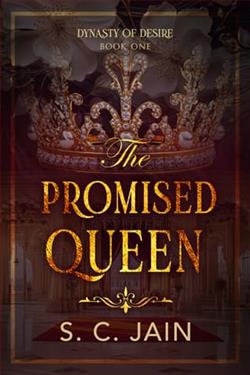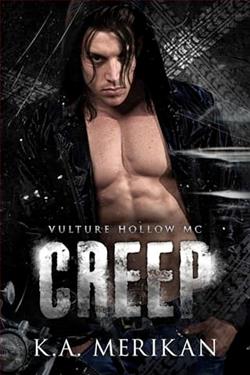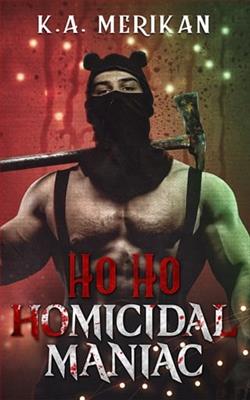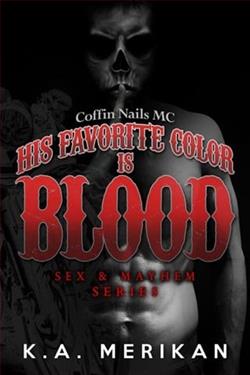Page 17 of King Among the Dead
The firelight bathed his throat, highlighting the movement of it as he swallowed. “But how can Jane love him in return? What about the wife in the attic? The cruelty of it? He’s cruel and he’s ugly.”
“Not to her.”
His brows went up, and then he became very still, before his head cocked to the side. “The lamb fell in love with the lion, I suppose.”
“Who says Jane’s a lamb?” She heard the quiet rush of his exhale. “I think – I think Jane has cruelty and ugliness, too. She’d have to, or they wouldn’t suit each other so well.”
He glanced toward the fire again. “Yes. Yes, I guess you’re right,” he mused. “Some find fault with the book, for failing to serve as a morality play at the end.”
She shrugged. “It’s a love story. Love doesn’t require morality, does it?”
He didn’t turn his head, but his eyes cut toward her, a wet gleam in the dimness. “No, I don’t guess it does.” He smiled again, a flash of a canine like a fang, before he schooled his expression with what looked like real effort, and studied the dancing flames. “You ought to go to bed, Rose,” he said, gently. “It’s late, and you’ll be sleepy tomorrow.”
It was a logical statement, but a clear dismissal, too. It stung, maybe more than it should have. “Right.” She stood and left the book behind on the chair.
When she was at the door, he called after her: “I think tomorrow we’ll start with some lessons. History, language, science. The normal sorts of things. You can’t have gleaned anything worthwhile in whatever bit of schooling you’ve had.”
She glanced back over her shoulder, but his profile was still toward her, half-hidden by a screen of his hair.
“Alright,” she said. “I’d like that.”
“Goodnight, Rose.”
“Goodnight, Beck.”
That night she dreamed of a rain-soaked beast sprawled across a chair, claws digging into the upholstery, golden, slitted eyes with tall pupils, and fangs as long as her fingers.
SIX
The next day after breakfast, Beck carried in an unused table and chairs from one of the fancier parlors and set them up in the center of the library rug. He brought her a stack of new spiral notebooks with crisp, white pages, and six pens with fresh black ink: untold luxurious the likes of which she’d never owned, like everything else he’d given her so far.
He wore a soft-looking blue shirt today, open at the throat, white undershirt peeking from beneath, tucked into olive corduroys and a pair of battered old loafers. Truth told, she liked him best in the stark, fitted blacks he’d had on last night, but there was something about his during-the-day clothes that made him feel more tangible. She studied him, while he had his back to her, pulling books down off the shelves. Appreciated the way his lean, hard shape was still evident beneath the softer, looser fabrics. He looked touchable like this.
At breakfast, he’d shown no signs that he wished to discuss their conversation in the library last night. Hair soft, dry, gleaming, his manner mild and warm, she’d realized he wasn’t going to address the side of him she’d glimpsed in the firelight: the whiskey, and cigarette, and tension of it all.
Today he was playing professor.
Last night he’d been something entirely different, and not playing at all, she didn’t think.
He turned, and she glanced hastily away so he wouldn’t catch her staring.
“I thought we’d start with a little bit of everything.” He set a hefty stack of books down on the table with a solidthump. The dainty table legs creaked a protest. “Then we’ll have a baseline for continuing.” He settled in across from her, pulled a book off the stack, and sent her one of his small, close-lipped smiles, his eyes warm. Honey this morning, again, safe and approachable. “How does that sound?”
“It sounds good.”
~*~
It turned out she’d managed to learn a great deal more at school than either of them had counted on. When she’d been admitted to Tabitha’s care, she hadn’t been able to stay in school full-time; only here and there, and the principal was one of Tabitha’s “special friends,” as she liked to call them, so Child Services had never heard about the truancy.
But she’d gone to public school her whole life before that, and not only had she been a model student – other children had bewildered and intimidated her, one of the many reasons she’d felt such an immediate attachment to poor Jane Eyre – and she’d loved reading besides. She’d taken lunch and recess in the library. Had checked out books to take home.
“Self-taught,” Beck said with a warm approval that left her grinning like an idiot. “Just like me.” He winked, and her skin tingled pleasantly.
“You were born after the Atmospheric Rift,” he continued, “so I say we go back to before then and work our way forward, filling in the gaps.”
They were discussing Leonidas and his Spartans when Kay harrumphed loudly from the threshold, rapped on the doorjamb, and said, “Are you gonna make that poor thing read about old, dead people all day, or are we ever gonna eat lunch?”
Ripped from the text, and Beck’s mellifluous analysis of it, Rose was startled to find that they had both leaned low over the table, heads bent together. When he lifted his head, she could count all the dark striations in his eyes; smell the tea on his breath. They were so close, and she was keenly aware of it.















